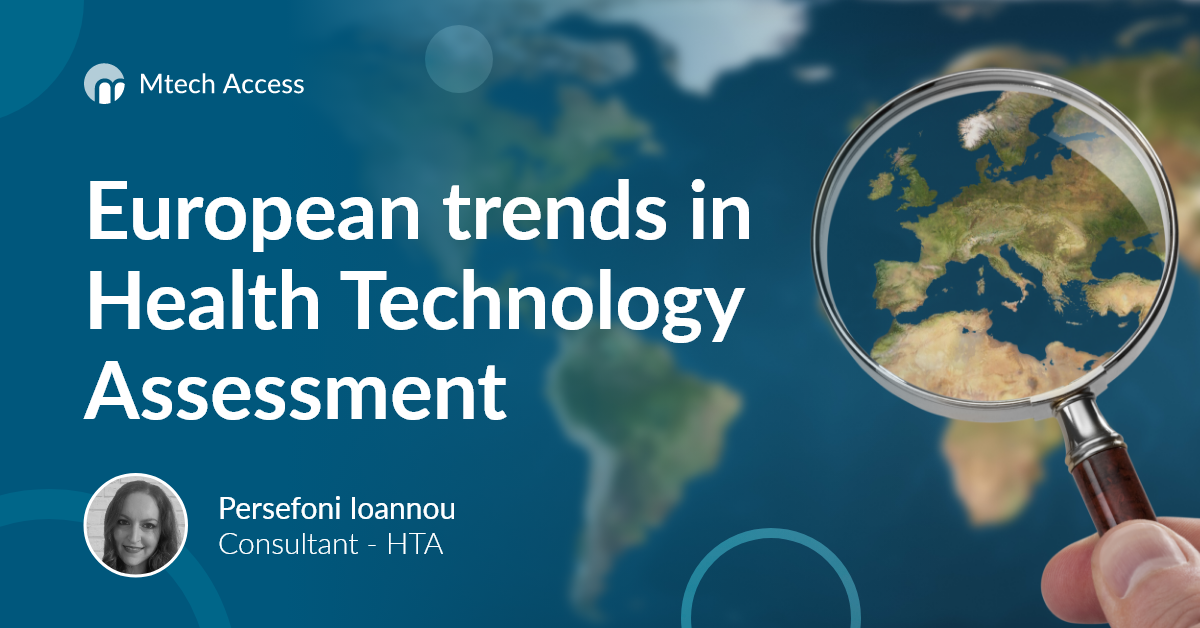
Inspired by the oral presentations and panel discussions at the recent HTAi Conference in Utrecht, The Netherlands, Persefoni Ioannou (Consultant – Health Technology Assessment [HTA]) shares some key trends in the European landscape for HTA.
Calls for a lifecycle approach to determine value
Experts in HTA are increasingly calling for a lifecycle approach to determining the value of medicines and medical devices, endorsing the idea that HTA needs to explore the value of health technologies from an early stage of development throughout their maturation.
A lifecycle approach would provide decision-makers with a more complete picture of a health technology’s value. However, implementing a lifecycle approach would present challenges and would mean significant changes to the current HTA submission process and requirements.
European HTA agencies join Heads of Agencies Group to foster collaboration
Following the conclusion of the EUnetHTA Joint Action 3 (JA3) in September 2021, the European HTA agencies launched the Heads of Agencies Group (HAG). This new HTA-focused collaborative network has been established to foster high-level strategic exchange and discussion between European agencies.
In the coming period, the HAG will focus on supporting the development of the basis for joint work on all HTA activities at the EU level, under the EU ‘HTA regulation’. Their aim is to support the preparation of national systems and capacities for the adoption of the HTA Regulation.
From 2025 onwards all new cancer medicines and advanced therapy medicinal products will be jointly assessed.
Overcoming evidence challenges for rare disease treatments
There is a particular need for collaboration to overcome challenges in generation and interpretation of evidence for rare disease treatments.
Common challenges faced by rare disease therapies when compiling their HTA submission include small populations and limited clinical expertise leading to poor understanding of natural history, relevant outcomes, and interpretation of changes indicative of patient benefit.
Early engagement with stakeholders may be useful to mitigate challenges associated with evidence development in rare diseases. This may include early conversations between manufacturers, regulators and HTA agencies or interim check-in points during evidence development to determine what constitutes the ‘right evidence’ and whether a new approach is required.
There is a real need to co-create this early dialogue with clinicians and patients to really understand how this research needs to be undertaken.
Joint HTA assessment in Europe presents a great opportunity moving forward. It would, however, take years for the regulation infrastructure to be developed so that it can allow a high volume of assessments to take place and to ensure that they reflect the political socio-economic aspects of different countries.
At Mtech Access, we have previously explored some of the challenges facing rare disease treatments looking to achieve market access. For more on this topic check out the following resources:
- On-demand webinar: Rare disease market access – strategic and tactical challenges facing orphan medicines entering Europe
- 4-part series of articles, exploring 4 roadblocks facing orphan medicines seeking to achieve market access in Europe: 1) Disease knowledge and awareness, 2) Clinical evidence development, 3) Economic evidence development and 4) Operational challenges.
Bringing gene and cell therapies to patients
Whilst gene and cell therapies have the potential to transform patients’ lives, they typically pose a higher commercial risk. With small populations set to benefit, as well as significant costs, determining value poses unique challenges. Experts across our industry are looking to address these challenges and ensure gene and cell therapies become a reality for patients, an established and accessible option within pathways of care.
A key element in addressing the challenges these therapies face is very early dialogue about where the gaps will be in the determination of value both at regulatory and payer levels. Looking at good quality data sources, including real-world data, will be key.
Supporting data, including trial outcomes, will need to reflect the patient experience. Patients will need to have a role in designing the data sources and analytics, and whilst outcomes need not be patient-reported, they should be patient-relevant.
Managed access agreements need to be well planned at the beginning of HTAs, with a clear definition of the key uncertainties along with data sources for addressing these and a set timeframe for data collection.
As the cost for these therapies is not inconsequential, innovators need to be willing to share appropriate risks. Outcomes-based agreements, for example, could be one solution.
Use of real-world evidence to support a lifecycle approach for HTA
The available evidence on relative effectiveness of new health technologies is often limited at the time of HTA. There is a clear potential for real-world evidence (RWE) to augment trials and answer additional questions to inform HTA/payer decisions.
Whilst stakeholders agree on what RWE can be collected for highly innovative technologies, uncertainty surrounds the payer/HTA questions that could be answered by real-world data and how the quality of these data could be assessed.
Cross-border, transparent HTA/regulatory collaboration to agree RWE requirements over the technology life cycle to inform initial recommendations and reassessment and development of data analytics methods are essential to support the generation, analysis, and interpretation of such data.
While guideline and process document updates will likely serve as the primary guide for best practice in using RWE in HTA, the responsibility to define best practices does not lie with HTA bodies alone. A collaborative effort including regulators, payers/HTA bodies, manufacturers, academic methodologists, and healthcare professionals is needed to develop and validate approaches to overcome challenges encountered in the use of RWE.
This article was inspired by the oral presentations and panel discussions our experts in HTA attended at the HTAi conference in Utrecht, The Netherlands at the end of June (2022). Samantha Gillard, Sandra Bashford-Bovens and Persefoni Ioannou were able to attend a wide range of the sessions to explore the thought leadership on offer, whilst also taking the opportunity to meet with people from across our industry.
To learn more about our HTA support services or to discuss your next HTA submission with our experts, email info@mtechaccess.co.uk.


